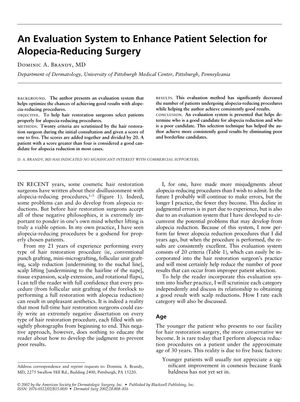An Evaluation System to Enhance Patient Selection for Alopecia-Reducing Surgery
September 2002
in “
Dermatologic Surgery
”

TLDR The evaluation system improves patient selection for hair loss surgery, leading to fewer but more successful surgeries.
In September 2002, Dominic A. Brandy, MD, introduced an evaluation system to improve patient selection for alopecia-reducing surgery, based on his 21 years of experience. The system scores patients on 20 criteria, each rated from one to five, during the initial consultation. A summed score divided by 20 that exceeds four suggests a good candidate for the procedure. This system has decreased the number of alopecia-reducing surgeries in Brandy's practice but increased the success rate by eliminating poor candidates. The document also predicts that alopecia reduction might gain popularity for treating vertex balding due to its advantages over follicular unit transplantation, such as denser and quicker results, less time and staffing required, and lower cost. The author emphasizes the importance of careful patient selection to prevent poor outcomes and suggests that the system could lead to a resurgence in the popularity of alopecia reduction surgeries.





